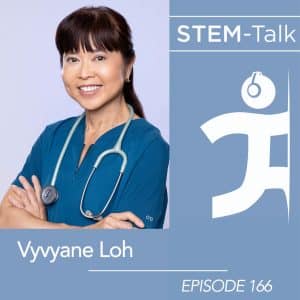STEM-Talk: Dr. Vyvyane Loh on atherosclerotic heart disease
Atherosclerotic heart disease (ASCVD) affects some 26 million people in the U.S., and annually leads 2 million hospitalizations and more than 400,000 deaths.

In this episode of STEM-Talk, Dr. Vyvyane Loh returns for her second appearance for a conversation about this disease. The episode is available now wherever you listen to podcasts.
Loh is a board-certified physician in obesity and internal medicine who spoke with us last time about her Boston-based preventative-care practice that specializes in weight management and the treatment of chronic metabolic diseases such as diabetes, hypertension and dyslipidemia.
In Episode 166, Vyvyane and host Dr. Ken Ford talk about ASCVD and the gap between clinical treatment and the advances in biological science research about risk factors, including updates to the anatomical aspects of the disease model itself.
“We’re focused on cholesterol because that’s what statins target,” Loh says. “The idea has been… this is the main way to prevent atherosclerotic disease. We’ve seen that hasn’t really been that effective.”
The substantial variability in individual response to statin therapy is just one component of this discussion. Loh notes that more attention should be paid to glycocalyces, a border that line every cell, including those of blood vessels.
“Like moss covering the rocks in a stream. It can act as a protective layer in your cells.,” she says. “It acts as a communication bridge between inside and outside of a cell.”
Loh says the focus should be on talking to patients about reducing the substances that can damage glycocalyces.
“We should be looking at atherosclerotic heart disease as an inflammatory process rather than just focusing on cholesterol,” she says.
The full conversation is fascinating and includes:
- Loh’s pet peeve that the current knowledge base informing clinical practice is far behind the advances in biological science.
- Where Loh believes the conversation about preventing ASCVD should be focused. “I think the behavioral and environmental components of risks of heart disease have been under emphasized.”
- What you should think of when you hear the word “metabolism”: “You should immediately be thinking about your immune system because they are intricately linked. We use metabolic pathways to turn on immune pathways.”
- What she has learned about herself through her passion for competitive dance.
Latest News
- STEM-Talk: Dr. Vyvyane Loh on atherosclerotic heart disease
- STEM-Talk: Dr. John Edwards on ketamine treatment for depression and suicide prevention
- Register now for IHMC Summer Robotics Camp 2024 sessions
- Peek behind the curtain at IHMC’s April 2024 Open House
- STEM-Talk: Dr. Michael Leon on the power of olfaction enrichment to ameliorate dementia symptoms
- IHMC hosts Dynamic Walking Conference in May 2024 drawing robotics experts from across the world
- Dr. Tom Jones Evening Lecture on March 14 includes book signing by Bodacious Bookstore
- STEM-Talk: Mark Mattson on the brain’s most important neurotransmitter
- IHMC Newsletter highlights human-machine teaming research and more

